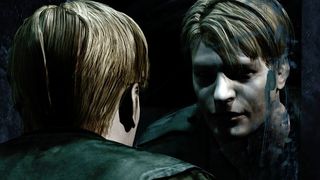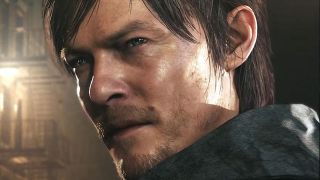The loss of Silent Hills would be the biggest tragedy of the Kojima/Konami fallout
Note: This editorial was originally posted on March 27, 2015, but given the weekend's apparent revelations regarding the game's seeming doom, we felt it timely to run it again.
I still remember the very first time I saw Silent Hill. After playing through loads of wonky Resident Evil imitations, I had had my fill of bad voice acting. But Silent Hill was a different, more cerebral experience to Capcom's zombie mansion. It was the first time that a game buried itself into my brain so totally. Never had my imagination been fired up as much as it was by those dark corners of the otherworld. Playing Silent Hill was like having a nightmare I didn't want to wake up from. For an example of its power, check out Max's excellent dissection of one of its key early scenes.

But since 2004, Konami has left its baby out in the wild. Disbanding original devs Team Silent after the middling SH4: The Room, the series has struggled to return to those early creative heights. Outside of the ever loyal fanbase, player interest has moved on. The triple whammy of Downpour, Book of Memories and the botched HD collection failed to reignite interest in 2012. So when Silent Hills was sneakily announced last August, with Hideo Kojima and Guillermo Del Toro at the helm, running on the FOX engine and starring The Walking Dead's Norman Reedus, it really did seem too good to be true. And sadly, that could well now be the case. The recent talk of Kojima (potentially) leaving Konami after Metal Gear Solid 5 leaves Silent Hills with an uncertain future.
Horror games have split into two forms recently. In the AAA arena, releases have tailed off. Two of the biggest survival horror franchises, Dead Space and Resident Evil, became more action orientated as development budgets increased, in order to reach a bigger audience. Last year's excellent Alien: Isolation was a slight return to the days of limited resources and ramped-up tension, but didn't manage to set sales alight. However, in the indie sector, the genre is in (a kind of) rude health. Slender, based on mythical internet spook Slenderman, was a huge sleeper hit thanks to live streams and Let's Plays. But like a theme park ride, many of these games have been all-thrills, no substance. They may give a good jump, but the likes of Slender and Outlast never really got under my skin.
So when Silent Hills’ teaser, P.T., was sneaked out at the Gamescom PlayStation conference, it looked like another wander-em-up. But while it takes its superficial cues from the new indie horror model, its content does anything but. There's a full analysis of what it makes it work here. Suffice to say the twist reveal was another example of Kojima's outside-the-box thinking. For the first time in almost a decade, there was a big buzz about Silent Hill. Sam Barlow, writer of Silent Hill Origins and Shattered Memories, is a fan of P.T. “I liked it”, he tells me. “It reminded me a lot of the indie horror scene of the last few years. Simple, atmospheric horror games with minimal gamey-ness. That sense of a domestic interior abstracted and looped. The Kojima-level of expense and polish set it apart”.
Over the last couple of years, there's been a growing focus on storytelling in games, but Silent Hill was rewriting the rulebooks back on the PS1. Harry Mason wasn't a trained soldier, just a father searching for his daughter. Crafting its tale of cults and ancient evils within an oppressively thick atmosphere, the first game sends him through a town frozen in time, filled with truly disturbing demons of the netherworld. With Akira Yamaoka's soundtrack crossing genres from faded Americana to Industrial drone, this was a classier kind of creeping dread. “I remember playing the demo for SH1 over and over again “ recalls Sam Barlow. “It felt so fresh and scary. The music, the camerawork, the atmosphere of ‘wrongness’”.

But to many people, myself included, Silent Hill 2 is the real high point of the series. For Let's Player Voidburger, it was her first brush with the games “The story and mood really grabbed me about that one. I’m interested in things that are strange, uncanny and intriguing, but not scare-the-crap-outta-ya frightening, so SH2 was perfect for me”.
Sign up to the GamesRadar+ Newsletter
Weekly digests, tales from the communities you love, and more
Sam Barlow feels the same way. “SH2 was a landmark in terms of its atmosphere and the spaces it was exploring. Particularly back then, it was one of the few commercial franchises that was capable of exploring contemporary settings, characters with inner lives. It was one of the games that didn't feel the need to be fun, was scratching a deeper itch”.
Taking the ‘simple’ plot of the search for a dead wife as a starting point, Silent Hill 2 is a long dark journey of the soul that sees James Sunderland finally come face to face with his inner demons both metaphorically and literally. Though it touches upon taboo subjects like mental illness, incest and euthanasia, it does so in a mature and reserved manner. Masahiro Ito's creature designs, taking influence from Irish surrealist Francis Bacon, are perfectly realised nightmares made flesh. Silent Hill 2 is also the title that introduces Pyramid Head, a manifestation of James' need for punishment, and one of gaming's truly iconic threats. Silent Hill 2 was a whole new benchmark, not just for the genre but for video games as a whole. To my mind it's still the best example of how games can be the perfect storytelling medium.
Silent Hill 3 and 4, though not as well received, still offered new and bold directions for horror gaming. SH3 had a confident young woman as its protagonist, something that games still have a problem realising effectively. Its plot touches on abortion, and can also be read as a critique of the destructive nature of fundamentalist religion and the way faith can be used to exploit those it claims to save. Silent Hill 4: The Room is the unloved stepchild of the series, yet is still an interesting and surreal experience. Locked in your tiny apartment by an unseen force, what should literally be your safe house is slowly invaded by ghosts of a serial killer's victims. P.T. could be seen as a continuation of The Room's conceits, as you wander through its looped corridor being stalked by a malevolent spirit. Voidburger agrees. “It feels like an evolution. Not so much a direct relative of the previous games, but a differently-adapted descendant”.
Right now Silent Hills exists only as a wealth of possibilities. The only concrete details we have are that it'll run on the FOX engine and will star Norman Reedus. What we can speculate though? With Kojima bringing Metal Gear Solid into the open world genre, maybe he has the same plan for Silent Hill. How it'll still deliver an expertly crafted narrative, if that’s the case, remains to be seen. But with Del Toro's involvement, hopes must be high for whatever the game does with its story. His style of horror is in keeping with Silent Hill's emotional otherworldliness, and though he's inexperienced in game development, hopefully he can bring in a new perspective that will make Silent Hills stand out.

In terms of mechanics, FROM software's Dark Souls and Bloodborne are currently redefining both action games and certain elements of survival horror, not least via the tense, fraught way they conduct online play. Maybe Kojima has been paying attention to this and will offer some way for players to invade other games. That conspicuous 's' on the end of the new game's title certainly implies the possibility of multiple worlds. And besides, people love to watch other players get scared. There’s a strong argument that P.T.’s shifting, remixing design was creating mindful of the popularity of horror-based YouTube Let’s Plays.
To say Hideo Kojima is a big name in game development is a ridiculous understatement, and his departure would be a big blow for Konami. But with Metal Gear Solid 5 nearly done, that series is in safe hands, at least for the immediate future. But as a series that's already had a long period of uncertainty, the loss of Kojima would be a far crueller twist for Silent Hill. At a time when the current gen isn't yet offering anything vastly different to the last one, Silent Hills has the clear potential to be a defining title. Its franchise just has such a standout history of taking risks.
“Despite their reputation as 'scary games', what I love about Silent Hill games is that, ultimately, they have a lot of heart”, says Sam Barlow “They have flawed people who can find redemption or catharsis”. Kojima could have been Silent Hill's redeemer, and I sincerely hope that he still will be. I’m crossing everything in the hope that series and fans alike soon get the catharsis that they deserve.
Thanks to Voidburger and Sam Barlow for their participation. Check out Voidburger's YouTube channel and the website for Sam's latest game, the intriguing mystery adventure, Her Story.
